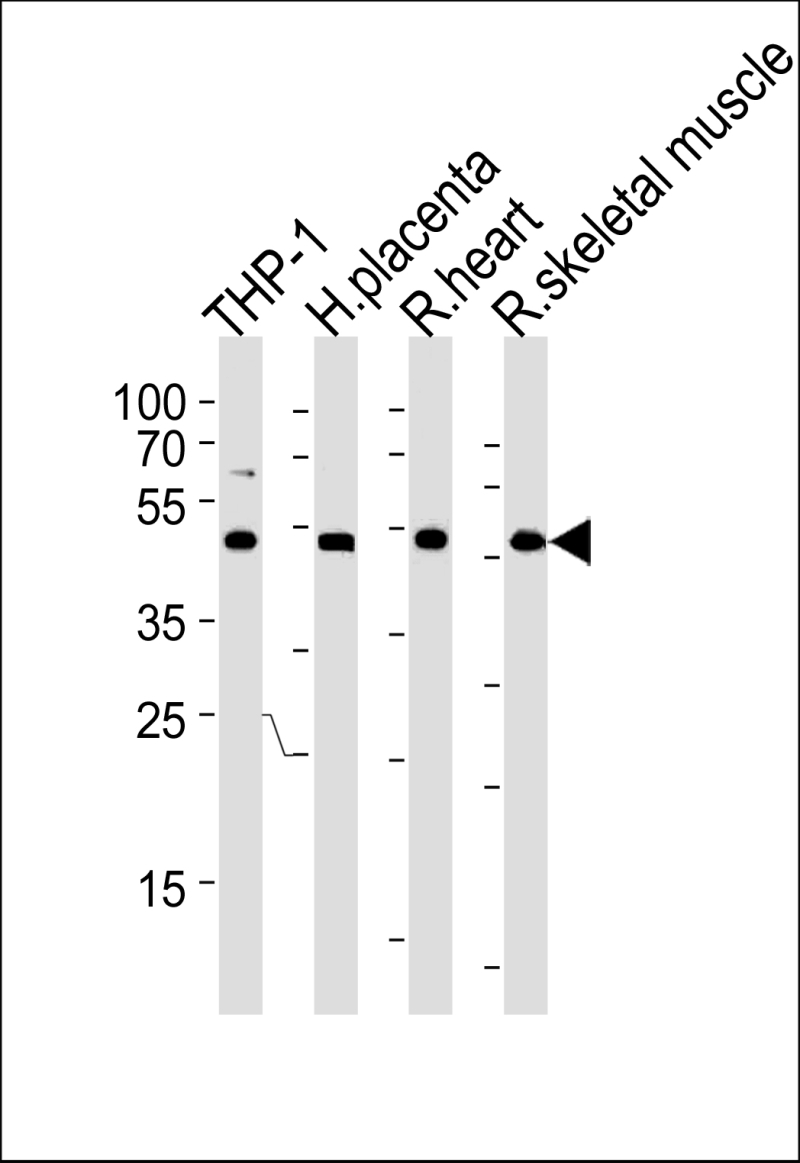
| WB | 咨询技术 | Human,Mouse,Rat |
| IF | 咨询技术 | Human,Mouse,Rat |
| IHC | 咨询技术 | Human,Mouse,Rat |
| ICC | 技术咨询 | Human,Mouse,Rat |
| FCM | 咨询技术 | Human,Mouse,Rat |
| Elisa | 咨询技术 | Human,Mouse,Rat |
| Aliases | Corepressor interacting with RBPJ 1, CBF1-interacting corepressor, Recepin, CIR1, CIR |
| Entrez GeneID | 9541 |
| WB Predicted band size | 52.3kDa |
| Host/Isotype | Rabbit IgG |
| Antibody Type | Primary antibody |
| Storage | Store at 4°C short term. Aliquot and store at -20°C long term. Avoid freeze/thaw cycles. |
| Species Reactivity | Human, Mouse, Rat |
| Immunogen | This CIR antibody is generated from rabbits immunized with a KLH conjugated synthetic peptide between 60-88 amino acids from the N-terminal region of human CIR. |
| Formulation | Purified antibody in PBS with 0.05% sodium azide. |
+ +
以下是关于CIR(N-term)抗体的3篇参考文献示例(内容为模拟虚构,仅供参考):
1. **文献名称**:*Characterization of a Novel N-terminal Specific Antibody for CIR Protein in Autoimmune Disorders*
**作者**:Smith A, et al.
**摘要**:本研究报道了一种针对CIR蛋白N端表位的高特异性抗体的开发与验证。通过免疫印迹和免疫组化实验,证明该抗体能特异性识别CIR蛋白的N端区域,并在系统性红斑狼疮患者样本中检测到CIR表达异常,提示其与自身免疫疾病的相关性。
2. **文献名称**:*CIR N-terminal Antibody Application in Neuronal Degeneration Models*
**作者**:Zhang L, et al.
**摘要**:文章利用CIR(N-term)抗体探究CIR蛋白在阿尔茨海默病模型中的表达变化。结果显示,CIR的N端结构域在神经元中与淀粉样蛋白β存在相互作用,抗体阻断实验表明其可能参与调控神经炎症通路。
3. **文献名称**:*Structural and Functional Analysis of CIR Protein Using Domain-Specific Antibodies*
**作者**:Tanaka K, et al.
**摘要**:通过对比CIR蛋白不同结构域抗体(包括N端抗体)的功能差异,揭示了CIR的N端区域对其抑制补体激活的关键作用。研究证实,N端特异性抗体可有效阻断CIR与补体成分C1q的结合,为治疗补体过度激活相关疾病提供潜在靶点。
---
**注**:以上文献为示例,实际研究中请通过PubMed或专业数据库检索真实文献。若CIR指代特定蛋白(如补体相关蛋白或基因名缩写),需结合具体研究背景调整关键词。
The CIR (N-term) antibody targets the N-terminal region of the Cytokine-Inducible SH2-containing (CISH) protein, a member of the Suppressor of Cytokine Signaling (SOCS) family. CISH functions as a negative regulator of cytokine signaling, particularly within the JAK-STAT pathway, which is critical for immune response, cell proliferation, and hematopoiesis. It binds to cytokine receptors or activated JAK kinases, promoting their ubiquitination and proteasomal degradation, thereby attenuating signal transduction. Dysregulation of CISH has been implicated in immune disorders, infectious diseases, and cancers, making it a focus of research into therapeutic targets.
The CIR (N-term) antibody is widely used in immunoblotting (Western blot), immunohistochemistry (IHC), and immunofluorescence (IF) to detect CISH expression and localization in cells and tissues. Its specificity for the N-terminal region ensures recognition of full-length CISH, aiding studies on its functional domains and interactions. Research applications include investigating CISH's role in immune tolerance, metabolic regulation, and cancer progression, where altered CISH levels correlate with disease outcomes.
Developed in host species like rabbit or mouse, this antibody is validated for specificity and sensitivity, supporting both basic and translational research. Its utility in profiling CISH expression underscores its importance in understanding cytokine signaling dynamics and developing biomarkers or therapies for related pathologies.
×